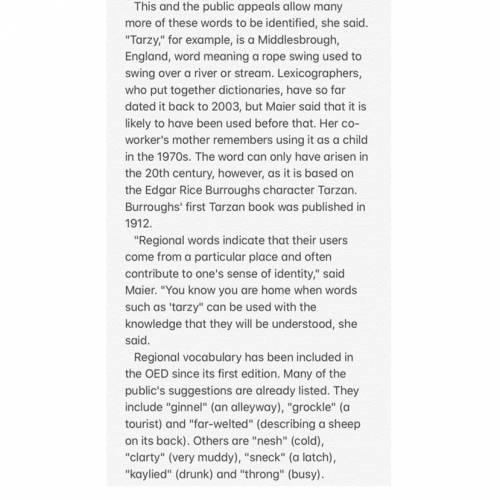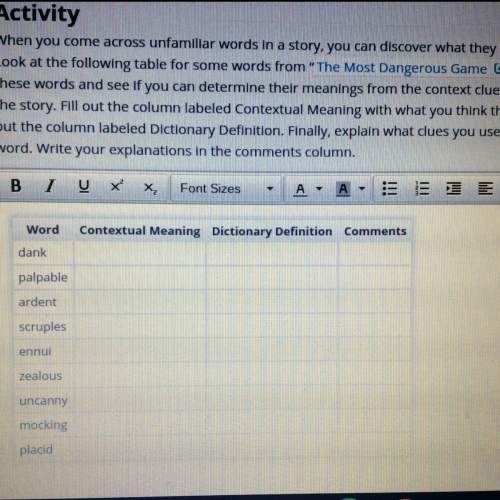
English, 19.05.2020 04:02 ethan62211
PLZZ write a short paragraph that explains the central idea of the article+use 2 details from the article to support the response.
—The English language is used in different and colorful ways around the world. The same words can be used in different ways, depending on where you live. People can also have completely different ways of saying the same thing.
The Oxford English Dictionary (OED) is asking the public to help it find the regional differences in English around the world. It wants to expand its record of the language, with early submissions ranging from New Zealand's "munted" to Hawai's "hammajang."
Last year, the OED, BBC Radio and the Forward Arts Foundation teamed up to find and define local words in the United Kingdom. It resulted in more than 100 new regional words and phrases being added to the dictionary. They ranged from Yorkshire's "ee bah gum" (oh!) to the northeast's "cuddy wifter," a left- handed person. Yorkshire is a county in northern England.
Now, the OED is widening its search to English speakers around the world. Associate editbr Eleanor Maier called the early response "phenomenal." Editors are beginning to draft a range of suggestions to include in the dictionary.
These range from Hawaii's "hammajang," meaning "in a disorderly state," to the Scottish word for a swimming costume, "dookers" or "duckers." There is also New Zealand's "munted," meaning "broken or wrecked."
**Words On The Short List**
The OED is also looking to include the word "chopsy," a Welsh term for an overly talkative person, "frog-drowner," which Americans might use to describe a torrential downpour of rain, and "brick," which means "very cold" to residents of New Jersey and New York City. The dictionary is also looking at adding "round the Wrekin." It is a phrase from the middle of England, which means "in a lengthy or roundabout manner."
The dictionary has already found that, depending on location, a picture hanging off center might be described as "agley." It might also be called "catawampous," "antigodlin" or "ahoo." A loved one could be called a "doy," "pet," "dou-dou," "bubele," "alanna" or "babber."
"The OED aims to cover all types of English, including standard English, scientific and technical vocabulary, literary words, slang and regionalisms. So it's important to include these words to enable us to present a picture of the Enalish lanauage." said Maier.
The Words Where You Are appeal is looking for more suggestions. These words will go with the regional words suggested by people in the U. K. last year. In that request, BBC Radio listeners were asked to send in their local turns of phrase. Those were later used in poems by authors including Liz Berry and Hollie McNish for a National Poetry Day project.
"We were surprised and pleased by the number of regional words we were able to include as a result," said Maier. "With the public's suggestions as a starting point, we were able to unearth a rich seam of regional vocabulary."
**Words That Come From A Specific Place
Some of the words suggested in the U. K. date back centuries, such as "zamzawed." It's a term in Devon for food that has been spoiled by overcooking. Devon is a county in southwest England. Then there are more recent coinages such as "jarg," used in Liverpool to refer to something false or misleading. Liverpool is a city in northwest England. Other additions now in the OED include "antwacky," meaning old-fashioned, and "barry," meaning great, with more to come. Maier said thatit can be difficult for the OED's editors to identify regional words. The expressions are more often spoken than written down. The editors require citable evidence to include a new definition.
"In recent years, resources such as Twitter have been a great way for us to monitor the words that people are using informally in particular parts of the world," she said.
*THE REST OF ARTICLE IS ON PICTURE*


Answers: 1


Another question on English

English, 21.06.2019 23:00
Read the sentence. a few of the committee members did not attend which of the following accurately labels the bolded words? predicate adjective simple predicate predicate nominative complete predicate
Answers: 2

English, 22.06.2019 08:40
When should evidence be quoted directly and when should it be paraphrased? identify which approach the student in each scenario should use. paraphrase or quote for each box.
Answers: 1


English, 22.06.2019 12:00
Explain the subject-verb agreement rule that applies to a singular collective subject functioning as a single unit. demonstrate your understanding of the rule by composing a sentence that uses the singular collective subject "crew”
Answers: 2
You know the right answer?
PLZZ write a short paragraph that explains the central idea of the article+use 2 details from the ar...
Questions


Social Studies, 19.10.2021 17:50



Chemistry, 19.10.2021 17:50


Health, 19.10.2021 17:50

Mathematics, 19.10.2021 17:50

Mathematics, 19.10.2021 17:50



Mathematics, 19.10.2021 17:50


Mathematics, 19.10.2021 17:50

Business, 19.10.2021 17:50

Chemistry, 19.10.2021 17:50



Mathematics, 19.10.2021 17:50

English, 19.10.2021 17:50




